The New Realities of Freelancing After 50
The 'Freelancing in America: 2019' report has a few surprises
People 50 and older who freelance, according to the just-released Freelancing in America: 2019 report, fall roughly into two groups. There are those on the younger side who do it for the flexibility or because they think they might not be able to find work otherwise. And there are those on the older side who are more likely to freelance because they want to do so.

And although 60% of freelancers 65 and older surveyed by Freelancers Union and the online freelance platform Upwork are happy with how much they work, only 48% of those 50 to 64 say they have all the work they want. Freelancers Union and Upwork broke out its findings for people 50+ exclusively for Next Avenue.
The low percentage for freelancers in their 50s and early 60s having all the work they want could be troubling, considering they’re at a time of life when saving for retirement is so important, said Cal Halvorsen, who studies later-life employment as an assistant professor at Boston College’s School of Social Work.
Freelancing in America by the Numbers
Because there’s a 50/50 chance of losing your job involuntarily after 50, it’s possible that people in this age group are freelancing because they “might have been pushed into it,” Halvorsen said.
Nearly a third of people over 50 freelanced in the past year.
The Freelancing in America: 2019 report is based on an online survey conducted this summer of 6,001 U.S. adults who did paid work in the past 12 months. Of the 2,117 freelancers in the study, 583 were 50 and older. The report defines a freelancer as anyone who’s done supplemental, temporary, project or contract work on a full-time or part-time basis. That can mean everyone from Uber drivers to freelance writers to consultants to people selling items on eBay.
Life expectancy has improved so much that retiring at 65 doesn’t make as much sense as it once did, and that’s reflected in how many people continue to freelance past that age, said Upwork CEO Stephane Kasriel. “In some cases, people go back to work and do something radically different from their previous profession,” he noted.
Nearly a third of people over 50 freelanced in the past year, according to the report. That’s a tad under the 35% for all age groups. A slightly larger percentage of people over 65 worked for themselves (34%) than people 50 to 64 (27%).
Freelancing By Choice or Necessity?
Although the number of U.S. freelancers hasn’t risen in the past few years — hovering around 57 million — the percentage who do it by choice, rather than out of necessity, has increased, from 53% in 2014 to 60% in 2019, according to the report. The same trend holds true for older workers. In 2019, close to six in 10 freelancers age 50 to 64 and 73% of those 65+ do so because they want to, the researchers found.
One reason freelancing is so enticing to many people 50 and older: the flexibility to work when you want, where you want.
A substantial portion of older freelancers surveyed (42%) say they work for themselves because they can’t work for a traditional employer. This group includes people with physical or mental health issues that would make it difficult to work in a traditional office setting as well as those caring for older or younger family members.

Transitioning to Retirement
Late-career freelancers see freelancing as a transition toward retirement, including 60% of those 50 to 64 and 69% of freelancers 65 and older.
Since it's still rare for employers to offer phased retirement programs where people gradually shift from full-time work to working part-time or not at all, freelancing could be an alternative to that, said Jeri Sedlar, a retirement expert and author of Don’t Retire, Rewire.
It’s clear from the data that many Americans freelancing after 65 are doing so because they enjoy it, while some do so because they need the money for retirement. “There are people who don’t have enough money for retirement” who continue to work, Sedlar said. “But others are still in the game because they want to be in the game, not because they have to.”
Quite a few freelancers in their 50s and early 60s might be tempted to become employees again. The survey found that only 55% of them say they would never go back to being an employee.
One likely reason: benefits.
What About Benefits?
Freelancers generally aren’t eligible for employee benefits, so the onus is on them to find and pay for health insurance and to save for retirement. Only about 13% of America’s solo self-employed participate in retirement savings plans at their current jobs, according to a recent Pew Charitable Trusts survey; that compares with almost three-quarters of traditional workers.
The Freelancing in America: 2019 report didn’t break out health insurance data for freelancers by age, but found that 83% of full-time freelancers carry health insurance. Put another way, 17% of full-time freelancers lack health insurance.
In addition, 21% of full-time freelancers surveyed say they get health coverage through Medicaid, the government program primarily for low-income people.
If freelancers, including those in their 50s and 60s, aren’t earning enough to buy health insurance, let alone save for their retirement, “it leads me to be concerned about their future,” Halvorsen said. “The requirements of Medicaid are becoming more stringent. So to even be eligible tells me that [some] freelancers are earning incredibly low amounts of money.”
According to the report, the median hourly rate for skilled freelancers is $28; for unskilled freelancers, it’s $20.
Making health care more available and affordable was the top factor freelancers think politicians should focus on to attract self-employed people to move to their city or state, according to the report.
The Advantage Older Freelancers Have
Freelancers of all ages are most likely to find work through previous clients, friends and family, professional contacts and social media, the report found. Being older helps, because it’s likelier that you’ve established relationships to draw on for freelance work, Upwork’s Kasriel said. “You have a larger network, and that can pay off,” he noted.
The vast majority of all freelancers surveyed believe having the right skills is essential to their work and that keeping skills up-to-date is key to remaining marketable.
It’s especially important for older workers who are freelancing or thinking of doing so to keep up with the latest skills in their field, Sedlar said.
“If you want to stay in the game, you have to make sure you have the latest game book,” she said.

